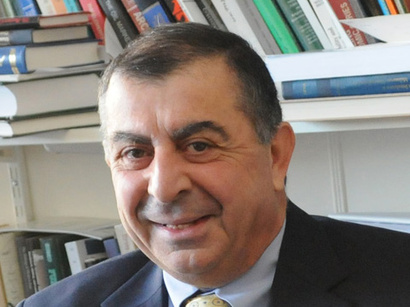West argues that Iran tries to buy time on its quest to become nuclear power: expert

The West argues that the whole nuclear issue is a charade for
the Iranian government to buy time and continue its quest to become
a nuclear power, professor of economics at U.S. Northeastern
University, Kamran Dadkhah told Trend.
"Hence, it is imperative for Iran to prove to the international
community that its nuclear activities are peaceful," he added,
commenting on the recent developments with Iran's nuclear
program.
The Islamic Republic's nuclear negotiating team reached an
agreement with P5+1 group on Nov. 24, according to which, Iran has
agreed to curb some of its nuclear activities for six months in
return for sanctions relief. Both Iran and the P5+1 group have
agreed to implement the agreement starting from Jan. 20.
The U.S. and its Western allies suspect Iran of developing a
nuclear weapon - something that Iran denies. The Islamic Republic
has on numerous occasions stated that it does not seek to develop
nuclear weapons, using nuclear energy for medical researches
instead.
Commenting on Iran getting access to its $4.2 billion of assets
blocked overseas, Dadkhah said that Iran is of course interested in
getting its money back.
Under the agreement, six major powers agreed to give Iran access to
$4.2 billion in revenues blocked overseas if it carries out the
deal, which offers sanctions relief in exchange for steps to curb
the Iranian nuclear program.
Iran would be getting the mentioned assets gradually, during the
agreed six months.
"It is about both Iran getting money and proving that its nuclear
activities are peaceful," he said. "The Iranian government has felt
the sting of sanctions."
"We may recall that by the end of summer, inflation rate was 40
percent and unemployment rate more than 12 percent according to
official figures," he continued. "Moreover, the fall in oil
revenues and the blocking of Iran's money in foreign banks caused a
shortage of foreign exchange."
"As a result, the exchange rate for the dollar vs. the rial has
tripled," Dadkhah said. "In sum, according to Iranian officials,
the country's economy was in crisis and in a free fall."
The professor went on to add that under such circumstances, the
government had no choice but to come to some agreement to ease and
ultimately lift the sanctions.
"But at the same time many in the United States and in the world
are suspicious of the Iranian government motives and intentions,"
he underscored.
Following the latest developments on the Iran-P5+1 agreement, Iran
has announced on Jan. 20 that as part of the deal, it suspends the
enrichment of uranium to 20 percent, and will continue to work
within the framework of the deal.
Here we are to serve you with news right now. It does not cost much, but worth your attention.
Choose to support open, independent, quality journalism and subscribe on a monthly basis.
By subscribing to our online newspaper, you can have full digital access to all news, analysis, and much more.
You can also follow AzerNEWS on Twitter @AzerNewsAz or Facebook @AzerNewsNewspaper
Thank you!
